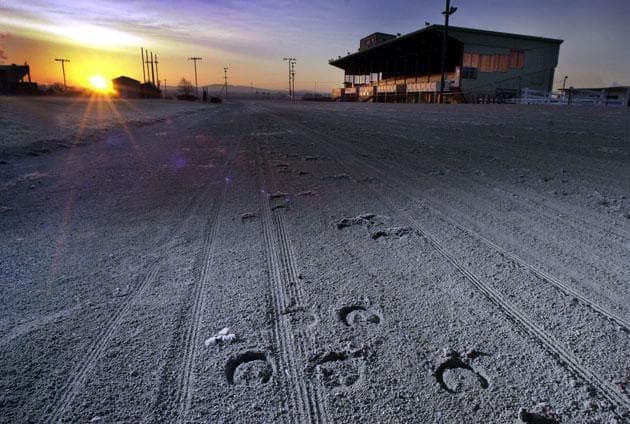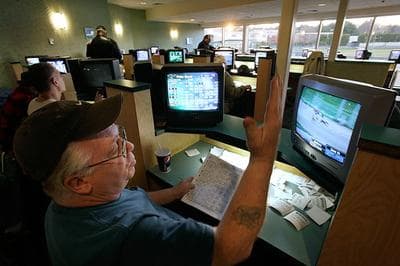Advertisement
'Racinos' Could Be Good For State Coffers, Bad For Economy

Massachusetts House Speaker Robert DeLeo made the case for legalizing gambling in the state on Thursday, saying his proposed measures would generate badly needed revenue and create jobs for blue-collar workers.
But how substantial could those benefits be? Many parts of the gambling industry are struggling during the economic downturn, and no one is sure how long the slump will continue.
Bill Thompson is a professor of public administration at the University of Nevada, Las Vegas, which, as you might imagine, is probably the world center for the academic study of gambling. I asked him the big question: How's the industry doing right now?
"Poor! One word: Poorly!" Thompson told me.
The gaming industry in Thompson's backyard is off 30 percent from its 2008 peak. Outside of Vegas, a quarter of the casinos in Atlantic City are in bankruptcy.
As for our neck of the woods?
"Foxwoods isn't doing very well, and Foxwoods is the premier casino in the world, the largest in the world," he said. "Boy, if they're not doing well, something's wrong."
Revenue at the Connecticut giant is down about 20 percent. Last fall, 700 employees got the axe.
But the trend has been different among the smaller slot parlors and "racinos," according to Clyde Barrow.

No, not that Clyde Barrow. I'm talking about the Clyde Barrow from UMass Dartmouth, who has been quoted in every other gambling story since Gov. Deval Patrick got elected.
"The 'racinos' have been done better across the East Coast than the resort casinos have."
I should note that Barrow has been criticized by some for taking industry money for his research.
Barrow said our recession-era tendency to look for kicks closer to home has actually been a boon to so-called "convenience gambling," small parlors like the ones in Maine and Rhode Island.
"Give you an example: Revenues at Twin River, despite their financial problems, have actually continued to go up right through the recession, the same is true of Hollywood slots in Bangor, Maine," Barrow said. (Overbuilding during the boom years has landed Twin River in bankruptcy proceedings, but revenue has been growing dramatically.)
Advertisement
He said that's one reason why Speaker DeLeo is pushing 'racinos' — to rake in instant cash.
"What the racetrack casinos hold out is the opportunity to collect some licensing fees right up front, as well as some actual slot machine tax revenue," Barrow said. "I mean they're already licensed gambling facilities, most of them have empty space, you can put slot machines in there in a comparatively short period of time."
Promises Of Reviving A Ghost Town
In Raynham, at the now-defunct dog track, manager Karen Roberts stands in the grandstand area.
"In its day, it was always packed, and you had the full line of tellers," she says, wistfully.
It has been empty since Dec. 31, 2009, when the state ban on greyhound racing took effect.
Today, this hundred-acre facility is a ghost town, a vast expanse of darkened chambers broken up with isolated pockets of light, where handfuls of mostly white-haired gamblers huddle around televisions simulcasting races from hundreds of miles away.
One man, who says he has patronized Raynham for 52 years, hopes for a nursing home in the infield.
This eerie quiet could change if DeLeo's proposed legislation passes.
"Between 60 and 90 days, they'd have a thousand slots that they could have up and running," Roberts says.
A thousand?
"Yeah. They're shooting for 2,500 but that would be over a 12-month time," she says. The race track would probably become a parking lot.
Roberts says she would be sad to see that happen, but, "you know it's part of the times, you gotta keep up with the times."
"Because the 'racino' makes money, the state will see more tax revenue. So it can be good for the politicians and the budget makers, but bad for the economy."
--Professor Bill ThompsonAnd Roberts does perk at the prospect of hiring back some of the 400 or so people she had to lay off last year. But even if those jobs come back, University of Nevada Professor Bill Thompson said slots at the tracks would probably be a net drag on the Massachusetts economy.
"The slot machine costs $15,000 dollars, you're losing that just when you buy the machine, and then if the gamblers are just local money, you never make it up," Thompson said.
Remember, parlors in Maine and Rhode Island owe their relative success right now to the fact that they serve local markets. So, Thompson said, if only Bay Staters go to the 'racinos,' our overall economy loses money.
"Yet at the same time, because the 'racino' makes money, the state will see more tax revenue. So it can be good for the politicians and the budget makers, but bad for the economy," Thompson said.
On the other hand, Speaker DeLeo says that infusion of revenue could be directed into a special fund to foster much needed blue-collar jobs beyond the gaming industry.
Related Stories:
This program aired on March 5, 2010.
